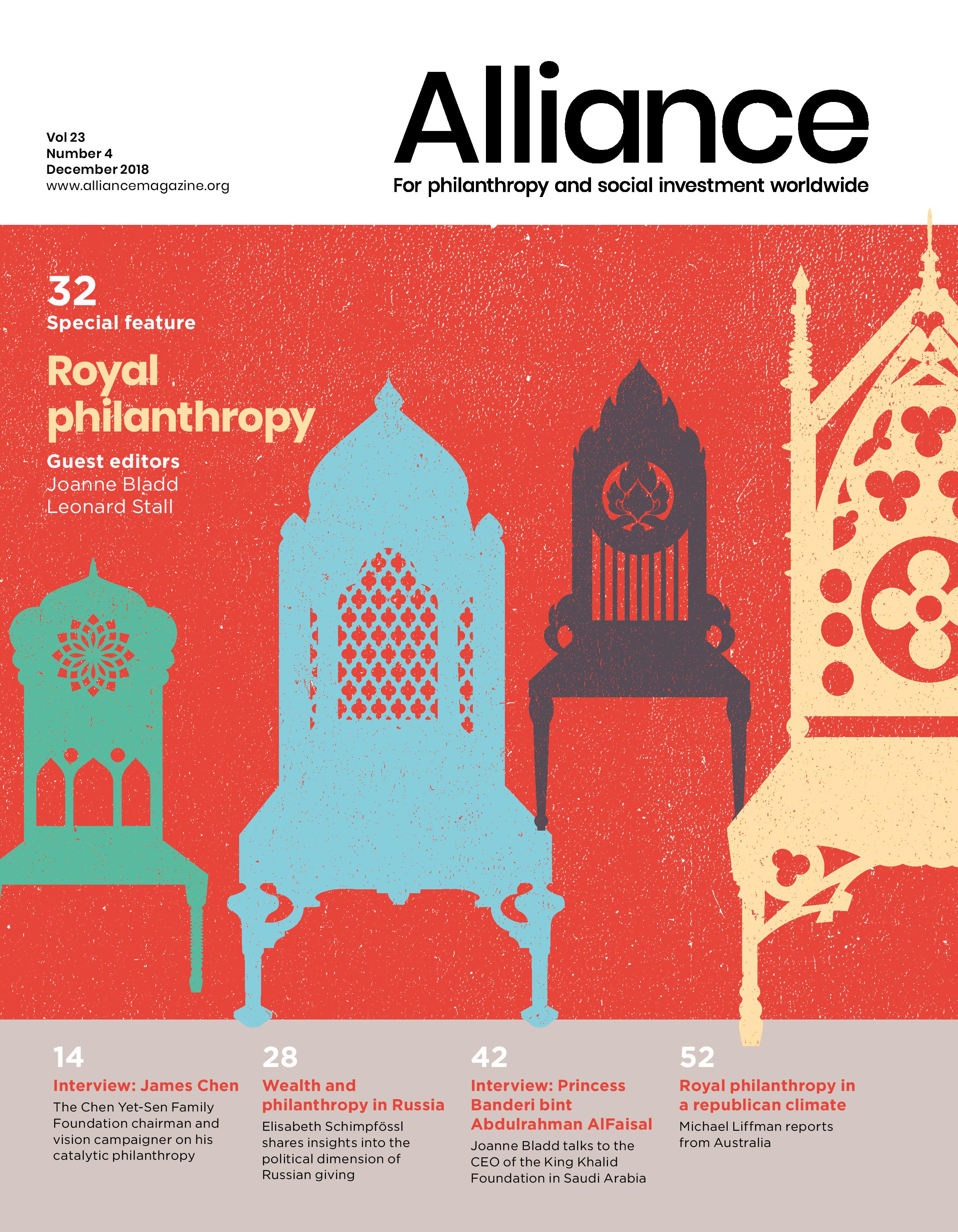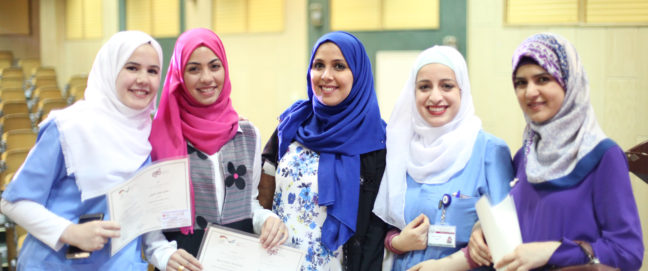Philanthropic initiatives are funded, undertaken or inspired by members of royal families around the world. Alliance associate editor Andrew Milner profiles royal philanthropy in its various shapes and forms
The Noor Al Hussein Foundation, Jordan
The Noor Al Hussein Foundation, founded by Royal Decree in 1985 and chaired by Queen Noor, is the implementing arm of the King Hussein Foundation’s community development initiatives. Its aim is to bring about lasting change in underprivileged communities by creating economic opportunities, building the capacity of those communities for self-reliance and improving livelihoods. Its programmes are in the areas of poverty alleviation and job creation, access to microfinance, the establishment of income generating enterprises for communities, and sustainable community development generally. Notable among them is the Women and Girls Empowerment (WAGE) initiative.
http://www.nooralhusseinfoundation.org
The King Baudouin Foundation, Belgium
Set up in 1976 with donations to mark the 25th anniversary of the reign of the then Belgian king as an independent foundation serving the public interest, KBF has become a leading European foundation combining roles of thought leader, grantmaker and donor-advised fund manager. As well as owing its name to the late king, the foundation created and manages a suite of funds related to members of the Belgian royal family. These include the Prince Philippe Fund which promotes dialogue and exchange between the different linguistic communities in Belgium (French, Flemish and German), and the Queen Mathilde Fund, established in lieu of marriage gifts to Prince Philippe and Queen Mathilde, which supports vulnerable children and young people and also awards an annual prize.
https://www.kbs-frb.be/en/
The Governor General, Canada
As designated representatives of the British monarch in dependencies which have become independent, the governor generals of former British colonies such as Australia and Canada enjoy a form of proxy royal status. A number of them are involved in supporting philanthropy. In 2017, for example, His Excellency the Right Honourable David Johnston, then governor general of Canada, supported the development of academic scholarship and teaching about philanthropy as well as the country’s network of community foundations.
https://www.gg.ca/
The Aga Khan Foundations, Switzerland
The UK’s Queen Elizabeth II bestowed the title of ‘Highness’ on the Aga Khan in 1957 – the 49th spiritual leader of Ismaili Muslims – when he succeeded his grandfather. Ismaili Imams also style themselves and family members as princes and princesses – a title the family inherited from their royal ancestor, Fath Ali Shah, an 18th century Persian king. The Aga Khan’s daily life includes duties toward the Ismailis and the Aga Khan Development Network which spans environmental improvement, health, education, architecture, culture, microfinance rural development, disaster reduction, and the revitalisation of historic cities.
https://www.akdn.org/
The Royal Foundation, UK
The Royal Foundation is the primary vehicle for the philanthropic work of the Duke and Duchess of Cambridge and the Duke and Duchess of Sussex – the next generation of leading British royals. Prince Harry used to attract media attention for nearly-nude photos and appearing at a dress-up party wearing a swastika armband. However, there has always been a serious and philanthropic side to the prince. As early as 2006, he co-founded Sentebale – with fellow royal, Prince Seelso of Lesotho – a charity working in Lesotho and Botswana with children who have been victims, either directly or indirectly, of HIV/Aids. Other notable initiatives include the Heads Together campaign, which brings together charities to change attitudes to mental health. He is also the founder of the Invictus Games, which supports injured servicemen. His elder brother, Prince William, has also asserted his philanthropic credentials. Earlier this year he gave a speech preaching the virtues of collaboration between charities working in the same area.
https://www.royalfoundation.com/
Sultan of Brunei
In some countries, it can be difficult to separate the philanthropy of royals from their roles as heads of state. Nowhere is this better illustrated than by the example of the Sultan of Brunei. Hassanal Bolkiah is not only sultan, he is also head of state with full executive authority, prime minister (self-appointed), minister of defence, minister of finance, commander-in-chief of the armed forces and the chief religious leader of the sultanate. While there is a foundation in his name, Yayasan Sultan Hassanal Bolkiah, it appears to have a relatively low public profile, certainly outside Brunei (its website is in Bahasa Indonesia and offers no translation).
Queen Máxima, the Netherlands
When it comes to philanthropy, few can match the hands-on approach of Queen Máxima of the Netherlands, the Dutch queen consort. In September 2012, she took part in the Amsterdam city swim. The feat attracted limited attention from the philanthropy press – with the focus on the then princess’s athletic prowess and the questionable state of Amsterdam’s canals for swimming – though it was part of a day of royal inspired volunteering, in this case to raise money for those with motor neurone disease.
Prince Albert II of Monaco Foundation
In June 2006, HSH Prince Albert II of Monaco set up the Prince Albert II of Monaco Foundation for the protection of the environment and the promotion of global sustainable development. The foundation supports projects in three main geographical zones, the Mediterranean basin, the polar regions and Least Developed countries (according to the UN’s definition). This includes the Sahelian countries of Africa, likely to bear the brunt of the effects of environmental degradation and climate change. Its three principal aims are to limit the impact of climate change and promote renewable energy, to safeguard biodiversity, and to manage water resources and combat the effects of desertification. Initiatives include Beyond Plastic Med, to prevent the pollution of the Mediterranean by plastic bottles and containers, and the Wood Forever Pact, a commitment against deforestation launched in 2010. Since its establishment, it has awarded $58 million to these and similar initiatives.
http://www.fpa2.org
The value of royal support
Prince’s Trust Group CEO, Dame Martina Milburn writes: In my experience, the real benefit of a royal patron is that they signify solidity, consistency and, above all, quality. In 1976, HRH The Prince of Wales invested his Royal Navy severance pay to found The Prince’s Trust, a range of community projects to benefit disadvantaged and marginalised young people. Most of the programmes we run today are based on ideas from HRH and he remains an active and passionate participant in events and activities, particularly those where our inspirational young people are involved.
The Prince inspires us to be the best organisation we can be. This is something our staff and volunteers understand and our partners and donors value. We try to take good decisions, to live our values and focus solely on our mission. We don’t get blown off course by the latest trend or fleeting funding opportunity, but we do innovate to improve what we do.
This year, The Prince’s Trust in the UK will support more than 70,000 young people. With youth unemployment and disengagement becoming a global issue, particularly in the wake of the financial crisis, governments and agencies across the world turned to us for advice and inspiration. To satisfy this demand, we launched Prince’s Trust International at the Commonwealth Heads of Government Meeting in Malta during 2015. We are now operating in nine countries, from Malta to Barbados, and the potential to make a bigger difference, worldwide, seems limitless. This, in turn, provides opportunities for philanthropists to support our work on an international scale.







Comments (0)